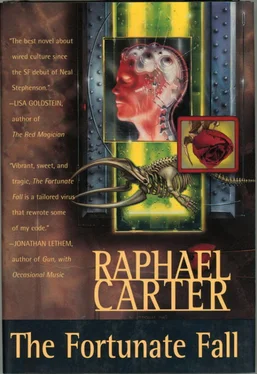Raphael Carter - The Fortunate Fall
Здесь есть возможность читать онлайн «Raphael Carter - The Fortunate Fall» весь текст электронной книги совершенно бесплатно (целиком полную версию без сокращений). В некоторых случаях можно слушать аудио, скачать через торрент в формате fb2 и присутствует краткое содержание. Город: New York, Год выпуска: 1996, ISBN: 1996, Издательство: Tor Books, Жанр: Киберпанк, на английском языке. Описание произведения, (предисловие) а так же отзывы посетителей доступны на портале библиотеки ЛибКат.
- Название:The Fortunate Fall
- Автор:
- Издательство:Tor Books
- Жанр:
- Год:1996
- Город:New York
- ISBN:0-312-86034-X
- Рейтинг книги:3 / 5. Голосов: 1
-
Избранное:Добавить в избранное
- Отзывы:
-
Ваша оценка:
- 60
- 1
- 2
- 3
- 4
- 5
The Fortunate Fall: краткое содержание, описание и аннотация
Предлагаем к чтению аннотацию, описание, краткое содержание или предисловие (зависит от того, что написал сам автор книги «The Fortunate Fall»). Если вы не нашли необходимую информацию о книге — напишите в комментариях, мы постараемся отыскать её.
“Gripping…. One of the most promising SF debuts in recent years”.
—“Publisher’s Weekly” starred review
The Fortunate Fall — читать онлайн бесплатно полную книгу (весь текст) целиком
Ниже представлен текст книги, разбитый по страницам. Система сохранения места последней прочитанной страницы, позволяет с удобством читать онлайн бесплатно книгу «The Fortunate Fall», без необходимости каждый раз заново искать на чём Вы остановились. Поставьте закладку, и сможете в любой момент перейти на страницу, на которой закончили чтение.
Интервал:
Закладка:
As I approached the whale, she opened her eyes, like a man briefly roused from an opium sleep. She didn’t see me—or if she did, I was beneath her notice. Perhaps what she looked at was not in this world.
And if the whale looked through me, then, too, the audience looked through her. The chips and tubes were transparent to their eyes, and even her flesh symbolic and not real. Looking at her, they were watching that vid with the whale in the iceberg. I tried to win them over by brute force, staring at the sores around her blowhole and trying to imagine what she must feel; I tried horror, pity, melancholy; but I couldn’t even mute their giddiness. Finally I gave up, made my mind a blank, and waited for the audience to grow calm.
Calm would not come. I’d caught what cameras call an updraft: just as the viewers got over their first rush of interest, others smelled the excitement and tuned in. The surprise of the newcomers strengthened the scent, attracting still more people, in a spiral that could make the feedback escalate out of control. Wave upon wave of astonishment crashed through me. I tried to look down, but the curiosity of millions forced my head back up. I stood there staring at the whale like someone forced to look into the sun, unable to turn away, though my mind cringed from the sight and my eyes were burning. It was not just an updraft, but riptide: feedback so strong that it flooded out my own emotions and derailed my thoughts. The audience grew so large and so greedy that it wouldn’t even let me blink. I sank to one knee—it was that or fall— and silently begged Keishi to cut off the input.
“News One says wait it out,” she said apologetically. “They think they can still bring in more viewers.”
Greedy sons of bitches. What are we up to?
“Do the words forty share mean anything to you?”
I was already brimful of the audience’s amazement, so the news could not surprise me, but I reminded myself to be impressed when my reactions were my own again. Two out of every five viewers in Russia —
“No, three out of five in Russia. I’m talking global. If this doesn’t taper off soon, you’ll be reaching half the people in the world.”
Well, the eyes of half the world were worth a little riptide. I stared at the whale until my tears dissolved it into halos, until my eyes were nothing but a dull ache boring its way deeper and deeper back into my head.
Keishi? I said, weakly. Does News One have any ideas on how I might manage to stand back up?
She didn’t answer, but I heard someone come up behind me, and felt a hand cover my eyes. The metal of his carapace was cold against my cheekbone: Voskresenye. The audience, cut off from the source of its excitement, grew quiet enough that I could blink and turn away. Voskresenye took my elbow and guided me to a chair.
When my eyes cleared, I saw that I was sitting with the whale behind me. It was like having your back to a man with a gun: the urge to look around was almost irresistible. But at least I could think. As he sat down across from me, I mouthed a silent “thank you,” which he answered with a slight nod of his head.
Gingerly, I touched the memories on the moistdisk. The audience let me, but I wouldn’t have wanted to try it a second time. Thinking with half the world inside my head was like crossing a frozen lake in smooth-soled shoes: the slightest misstep might send me spinning out of control. Fortunate, then, that I was in this chair, across from a man I could interview, with a moistdisk whispering in my ear. I had done this at least once a week for longer than I could remember. I could do it in my sleep—and even in this state. The castle of my mind had been usurped, but the maids could still cook just as well as before; and this was galley work.
“Pavel Voskresenye,” I began carefully, “when we last talked I was, shall we say, a little skeptical about the whale. Afterward, as I recall, I said to my screener, ‘You can’t put a whale in a tank. It’s like claiming you slipcovered Leningrad.’” I paused to wait out the giddy feeling of a million people snickering. “It looks like Derzhavin slipcovered Leningrad. But even now that I’ve seen it, it still seems impossible. Can you show me the flaw in my reasoning?”
“It seems unthinkable to you,” he said, “because you are Maya Andreyeva, a News One camera, and not Aleksandr Derzhavin, a Guardian scientist. That means, of course, that you do not have access to Calin’s treasuries or to unlimited amounts of slave labor; those are things that accustom a person to thinking big. But more important, it means that when you look at a whale, you see a living being—a creature with senses, organs, dimensions, passions. When Derzhavin looked at a whale, he saw none of that.
“All the Guardians experienced some degree of spiritual atrophy, or they could not have done what they did, but Derzhavin was an especially advanced and chronic case. He was an urbane, oftentimes a witty man; he honored the memory of his wife and he was gentle with his children. He was even, in his own way, scrupulously moral, though it was a purely arithmetical morality in which no sympathy was needed or allowed. Yet he was one of the most evil men that ever lived. It was not that he hated; he was beyond hatred, hatred is human. He seemed to have been born without the gene that enables us to see souls in the world—spirit-blind, as some are colorblind. When Derzhavin looked at a Kazakh or a whale, he saw a wetdisk, an organic computer, sheathed in a husk of irrelevant flesh. The body was an unfortunate complication, and the spirit just a dream of foolish men.”
Hypnotized by his voice, the audience had reached a state of calm attention. The clamoring to look behind me had grown weaker, and a genuine interest in his story was beginning to form. The camera in me had noticed that he’d twisted my question around so he could make the point he wanted to make anyway. No one with any sense would go into a News One interview without knowing how to do that; he’d be slaughtered. It’s something you expect your subjects to do, as you expect a chessplayer to castle. So you plan for it, and counter it. But for the time being, anything that calmed the audience was fine with me. If I needed to pin him down I could do it later, after people had started to switch back to their sitcoms. For now, keeping the conversation on anything but whales was more important. Still, I couldn’t help but worry that somewhere in our exchanges I would take a poisoned pawn.
“I’m afraid I cut you off in mid-story last time,” I said. “When we left off, you—well, you were doing what we just did: seeing the whale for the first time. How was it different for you?”
“In appearance she has not changed much. She is older, but that is not apparent to the untrained eye. I saw the same thing all of you just saw. Except that I knew, the moment I saw her, that she was a part of myself. I knew it not just because of the cable that connected us, but because as I looked into her eye, I was that eye, I was that wall of altered flesh.”
He paused, looking down at the carapace that covered his hand. The audience noticed it then for the first time, and it held their attention an instant; then they grew restless. Just when I might have lost viewers, he said:
“It is most difficult to explain, this being two selves at once, to you who are only one. You might as well try to explain your single self to a computer, who has none at all. For those of your viewers who speak Sapir—” He emitted a series of clicks and whistles, like a whale song played too fast. “Which I suppose, if pummeled into Russian, would be ‘O my amphibious—no, my hermaphrodite —soul.’ And that is hardly useful. Perhaps a metaphor will help.
Читать дальшеИнтервал:
Закладка:
Похожие книги на «The Fortunate Fall»
Представляем Вашему вниманию похожие книги на «The Fortunate Fall» списком для выбора. Мы отобрали схожую по названию и смыслу литературу в надежде предоставить читателям больше вариантов отыскать новые, интересные, ещё непрочитанные произведения.
Обсуждение, отзывы о книге «The Fortunate Fall» и просто собственные мнения читателей. Оставьте ваши комментарии, напишите, что Вы думаете о произведении, его смысле или главных героях. Укажите что конкретно понравилось, а что нет, и почему Вы так считаете.












